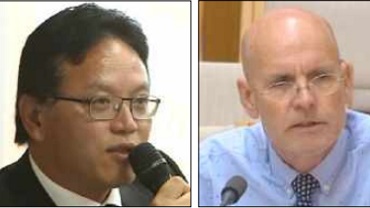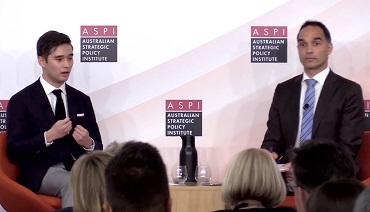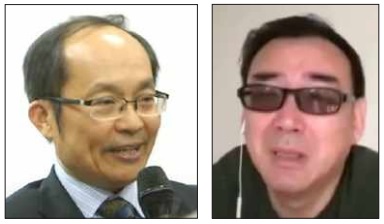Clive Hamilton’s books Silent Invasion and Hidden Hand are important, not because of the quality of the content— paranoid propaganda—but because the influencers behind Hamilton’s crusade reveal his role as a cog in a vast narrative management machine. (Part three of a series. Other instalments are available here: part one; part two; part four; part five.)
When Charles Sturt University public ethics professor Clive Hamilton published Silent Invasion in 2018, alleging a vast Chinese infiltration operation in Australia, it dramatically escalated mainstream media hysteria over Chinese influence on Australian politics. The book and the hysteria it fuelled justified the controversial espionage and foreign interference legislation the Malcolm Turnbull government pushed into law that year. Yet mainstream reporting exhibits a curious inconsistency: some Chinese “spies” are zealously exposed with only dubious evidence, while others are staunchly defended from official espionage allegations—seemingly to prevent uncomfortable attention falling on their powerful friends.
Silent Invasion alleges that in a 2005 meeting at the Chinese embassy in Canberra, officials were instructed to determine how China could attain “comprehensive influence over Australia … in all ways”. According to Hamilton, “We know all this because my informant Chen Yonglin … was at the meeting and read the documents.” The credibility of this claim has been taken at face value by most politicians and media in recent years, but closer investigation reveals that Australian authorities had dismissed it years earlier. As this article will show, face value acceptance is a common feature of most claims by anti-China agitators in Australia in recent years.
Hamilton’s “informant”, Chen Yonglin, was a former diplomat at the Chinese embassy who sensationally defected in 2005, claiming there was a network of over 1,000 Chinese spies in Australia. Chen claimed dissidents were kidnapped by the Chinese Communist Party (CCP), but a September 2005 report of the Senate Foreign Affairs, Defence and Trade References Committee revealed the Australian Federal Police had determined the allegation had “no substance”. The Australian Security Intelligence Organisation (ASIO), Australia’s domestic spy agency, would only say Chen’s claims were “being looked at closely”. If these 1,000 spies existed, we’ve heard nothing of them from ASIO since.
Chen also claimed to ABC-TV in August 2005 that a Chinese hit squad had travelled to assassinate him in retaliation for defecting, “a three-member team to conduct an operation called decapitation strike”. The 17 August 2005 Sydney Morning Herald reported that Australia’s Foreign Minister at the time, Alexander Downer, had declared Chen’s claim “highly improbable”. The alleged hit squad was apparently unsuccessful, as Chen, now an Australian permanent resident, continues to serve as a supposedly authoritative source on China, despite his lack of credibility. This includes expert interviews with Silent Invasion’s “ghostwriters”, the Australian Strategic Policy Institute (ASPI)—the think tank partly funded by the US State Department and NATO which is the source of virtually all of the anti-China analysis the Australian media pumps out daily.
Hastie hysteria
Liberal MP Andrew Hastie, Chair of the Parliamentary Joint Committee on Intelligence and Security (PJCIS), sensationally announced another Chinese “spy” defection in 2019. As reported in a series of 25-29 November 2019 articles in The Australian, Hastie alleges he was contacted by an intermediary of “self-proclaimed” Chinese spy Wang Liqiang, while at an Australian-American Leadership Dialogue meeting in the USA. This curious setting already raises questions, as Australia’s relationship with the USA is the source of the political pressure to be more confrontational towards China. Hastie said he decided to “hand it off to the intelligence services”, leaving the conference for a nearby US military base where he “brokered” Wang’s contact with ASIO using “secure” US military communications equipment.
On his return to Australia several weeks later, Hastie apparently changed his mind. Rather than leaving Wang to ASIO, as was appropriate, Hastie appeared on a sensationalist 24 November 2019 60 Minutes “World Exclusive” with Wang, declaring the alleged defecting spy was a “friend to democracy”. Hastie demanded the Australian government—of which he is an influential member—grant Wang political asylum. Underscoring the close coordination behind these stories, the 60 Minutes reporter, Nick McKenzie, fronts regular sensationalist anti-China stories (for which more than once his employer has had to settle defamation suits), and Clive Hamilton’s research assistant on Silent Invasion, ANU graduate-turnedASPI analyst Alex Joske, worked with McKenzie and 60 Minutes as a 22-year-old “strategic analyst” to verify Wang’s story.
As reported by The Australian on 29 November, several days after the 60 Minutes story ASIO declared Wang was “not the high-level operative-turned-defector he claimed to be”. According to Hastie, ASIO had been in contact with Wang for around six weeks before his 60 Minutes appearance, ample time to assess his credibility. However, ASIO delayed reassuring the public—resulting in diplomatic damage and rampant espionage hysteria.
According to Dr David Brophy, Senior Lecturer in Chinese history at the University of Sydney, speaking in The Australian on 30 November, the espionage panic gave Hastie “a valuable media platform to posture as a defender of democracy, and at the same time push for an increased role for unaccountable security agencies in Australian public life”. Evidently, both ASIO and Hastie benefited from cultivating unfounded espionage fears.
And disregarding even ASIO’s assessment, ASPI’s anti-CCP wunderkind Alex Joske stands by his “strategic analysis” of Wang’s story. Months later, on 13 July 2020, Joske tweeted he had only become more convinced Wang’s story was genuine.
Hastie habitually sensationalises “intelligence” received while visiting the USA. As part of a 2017 PJCIS delegation to Washington, Hastie met with US intelligence agencies. On return to Australia, he used the defamation protections of parliamentary privilege to accuse a Chinese-Australian businessman, Dr Chau Chak Wing, of bribing UN officials. Hastie’s accusations, based on “intelligence” received from US agencies, were discredited by a federal court. Media and journalist sued by Dr Chau for defamation, including Nick McKenzie, used Hastie’s speech to unsuccessfully defend their articles reporting the alleged bribery conspiracy, but the 27 June 2018 Sydney Morning Herald reported federal judge Justice Steven Rares denounced their reporting as “totally embarrassing” and a “fantasy”.
Such are the cases that constitute the evidence for the claim now taken as given that China is interfering in Australia. The very people behind the incredible claims have given them the imprimatur of official acceptance. In a 2018 inquiry into the Turnbull government’s espionage and foreign interference laws, Hastie’s Committee reported “compelling evidence” Australia was “facing an unprecedented threat from espionage and foreign interference”. Clive Hamilton told Hastie’s Committee the legislation was designed to “protect our freedoms” and “safeguard democratic rights that are under threat in Australia from the incursions of an authoritarian foreign power”.
On the other hand …
Hastie’s attitude towards the “unprecedented threat” of espionage reverses when it involves potential Australian espionage against China. In January 2019, Chinese authorities detained Chinese-Australian blogger and academic Dr Yang Hengjun over allegations of espionage. A 24 January 2019 Sydney Morning Herald article by Nick McKenzie quoted Andrew Hastie declaring Yang’s arrest “arbitrary” and demanding his release. Ironically for someone who is openly hostile to Australian journalist Julian Assange, currently detained by the UK on behalf of the USA for exposing US war crimes, on 7 April 2019 Hastie commented on Yang to Nick McKenzie again: “Mr Yang is an Australian citizen. He enjoys the rights and responsibilities of Australian citizenship. And so his detention, in a sense, is a detention of us all.” The Australian government repeatedly denied Yang was a spy working on its behalf, with Prime Minister Scott Morrison calling the allegations “absolutely untrue” (The Guardian, 29 August 2019).
In March 2020, China formally charged Yang with espionage. Intriguing details about Yang’s murky past surfaced: Yang worked for Chinese intelligence for fourteen years until 2000, including spying in the USA, prior to allegedly becoming an Australian resident in 2002, yet the Australian Department of Foreign Affairs and Trade (DFAT) was unable to clarify whether Yang was in fact a dual citizen. In apparent damage control, the ABC published an article titled “A spy and a democracy pedlar: The complicated truths in the life of Australian citizen Yang Hengjun” on 23 March 2020: “Shedding some light on his background may also help Australians understand that while Yang was at one time a Chinese spy, according to friends and those who’ve studied his case he has since turned on Beijing and become a dedicated advocate of western-style democracy … [in a] newfound career in Australia as a pro-democracy blogger and activist”. The ABC’s scramble to defend Yang is at odds with the Australian media’s history of fanatically alleging Chinese foreign interference in Australia. The ABC quoted anti-China zealots Hamilton and Chen, who defended Yang, offering detailed explanations as to why he was no longer a Chinese government spy.
Garnaut and ASIO
There is reason to suspect that Yang may have been spying on China. That is because of his relationship with aggressive anti-China journalist turned government espionage advisor John Garnaut, whom multiple sources have pointed to as the instigator of the Australian government’s sharp turn in foreign policy against China. Upon Yang’s arrest, Garnaut wrote to DFAT officials to advocate for his “close friend” Yang.
In 2011, while then-Fairfax correspondent Garnaut was stationed in China, he broke the story of Yang’s 48-hour disappearance during the time of the so-called Jasmine Revolution—a series of “pro-democracy” protests in China suspected to have been directed by US agencies. Yang’s disappearance triggered international outcry; however, anti-climactically, he resurfaced and claimed it was all a “misunderstanding”.
There’s now reason to suspect Garnaut and Yang were involved in an intelligence operation. Garnaut in 2016 experienced an unprecedented rise from journalist to advisor to Prime Minister Malcolm Turnbull, where he worked closely with spy agency ASIO—and through ASIO the “Five Eyes” spying partnership dominated by the USA and UK—to influence Turnbull’s adversarial shift towards China. In 2017, Garnaut and ASIO produced the classified “Garnaut-ASIO report”, which provided the “official” justification for Turnbull’s controversial espionage and foreign interference laws championed by Hastie and Hamilton. In April 2019, Garnaut claimed to Nick McKenzie and Fairfax Media that Yang was one of two Chinese-Australians targeted by Chinese officials to glean information about the Garnaut-ASIO inquiry. According to Garnaut, prior to a Sydney meeting Yang had with him, Chinese officials had intercepted and questioned Yang about his relationship with Garnaut.
Yang has an affinity for spy craft. In addition to pro-democracy blogging, he has authored a series of spy novels based around a character also named “Yang”. A 2017 book review described the plot: a US-China double agent “works for neither side but on his own account, and feeds false information to both sides in order to serve his own agenda—the precipitation of a US-China conflict.” A 2009 CIA/national security intelligence cable obtained by WikiLeaks revealed: “In one [blog] posting, [Yang] warned those who have no knowledge of espionage not to write books on the subject, clearly implying that he has such knowledge.” The cable noted Yang’s connections to influential Chinese officials, observing that he had “an interesting bio for someone who paints himself as a controversial critic of the Chinese government”. Although Yang’s writings would not catalyse radical change in China, it stated, “he does represent a gradual opening of the political discussion here that could pay dividends farther down the road.”
Prior to Yang’s 2019 detainment in China, he resided in the USA for two years. Weican Meng, Yang’s “close friend” of eighteen years, was interviewed by the ABC about his arrest, and revealed the friends dined together in New York City the night before Yang’s departure for China, when Meng saw his friend off to the airport. Meng’s organisation, China Free Press, has received substantial funding from US governmentfunded regime-change agitator the National Endowment for Democracy (NED). Meng is the founder of Boxun—the USbased Chinese-language publication central to coordinating the 2011 Chinese Jasmine Revolution protests, which, according to private intelligence company Stratfor, the Chinese government believed was an attempted CIA-instigated “Tiananmen II”. (“China narrative part two”, AAS, 26 August 2020.)
After Yang was detained, his PhD doctoral supervisor and longtime friend, University of Technology Sydney (UTS) Professor Dr Feng Chongyi, produced a letter which Yang allegedly authored back in 2011, to be safeguarded by Feng and released if Yang were ever arrested. He released it to Nick McKenzie, who reported it for Fairfax Media on 28 January 2019. Yang’s impassioned pro-democracy letter included a confession, claiming he lied about his 2011 arrest “misunderstanding” as reported by Garnaut, and that he was actually abducted by government agents.
Feng is a Chinese-Australian academic, who is the second of the two Chinese-Australians John Garnaut claims China targeted for information about the Garnaut-ASIO espionage inquiry. Feng has outspokenly defended Yang: while once a Chinese spy, he claimed, Yang is today “an Australian citizen committed to democratic ideals and deserves the protection of the Australian Government”.
Feng was the introductory speaker at the launch of the Chinese-language edition of Silent Invasion. Hamilton maintains Silent Invasion can’t be racist, because Chinese-Australians such as Feng have praised it.
Feng is a longtime supporter of Liu Xiaobo, the late Nobel Peace Prize-winning Chinese “dissident” who was in fact a pro-Iraq war neoconservative colonialist, who had received millions of dollars in NED funding. Alongside Yang, Feng was a signatory to Liu’s “Charter 08” democracy manifesto. (Notably, Yang’s lawyer, Shang Baojun, also formerly represented Liu Xiaobo.) Writing about a 2003 conference on Chinese liberalism in Sydney, Feng included a photo of himself pictured with a number of “pro-democracy” intellectuals linked to hawkish US thinktanks and the CIA-linked regime-change apparatus, NED.
In 2017, Chinese authorities detained Feng for a week and questioned him over his alleged connections with overseas intelligence agencies. Interestingly, writing for the Sydney Morning Herald on 29 May 2018, Nick McKenzie reported authorities specifically questioned Feng about his connections with his “longstanding friend”, John Garnaut. Chinese state-owned media outlet Global Times reported that according to a Chinese law enforcement agency source, Feng was “an informant to Australian security intelligence agencies” and “played the role of a ‘China studies expert’ to stigmatise and smear China”. In an interview with Sky News, Feng denied the accusations; however, an astonishing 12 September 2019 Twitter post by Clive Hamilton casually outed Feng as an ASIO informant: “And much of the evidence on the operations of CCP in Australia is generated by Chinese-Australians themselves”, Hamilton tweeted, adding: “Such as Professor Feng Chongyi at UTS and others operating under the radar. Where does PM [Scott Morrison] think ASIO gets its information from?” (Emphasis added.)
Feng maintains he was detained for meeting with Chinese human rights lawyers for his academic research. In 2017, UTS hosted a screening of “709 Documentary”, a film alleging human rights abuses of lawyers by the CCP, directed by a NEDlinked activist. The event was co-organised by Feng and the Chinese Human Rights Lawyers Concern Group (CHRLCG).
CHRLCG has received substantial NED funding and collaborates with the Chinese Human Rights Defenders, revealed by The Grayzone as a NED-funded activist group headquartered in Washington DC. NED’s grant databases show millions of dollars allocated to “support the work of Chinese human rights defenders”.
It is evident that Australians are being bombarded by a tightly-coordinated disinformation and public manipulation campaign that hysterically hypes Chinese actions in Australia as threats, but covers up real ASIO- and Five Eyes-directed intelligence operations targeting both China, and Australian foreign policy decision-making. This narrative management, involving a relatively small circle of actors—including author Clive Hamilton as the academic expert, Andrew Hastie in Parliament, Nick McKenzie in the media, John Garnaut in government, ASPI and ASIO—has had a sinister outcome: the invention of the China “threat” has created a pretext to justify harmful laws such as the foreign interference legislation that demonises any overtures of friendship as interference and thus destroys any chance of normalising relations; and Australia has undergone a radical turn in foreign policy aligned with a US-UK geopolitical agenda that is leading to war.
By Melissa Harrison, Australian Alert Service, 9 September 2020
Read part four here.











